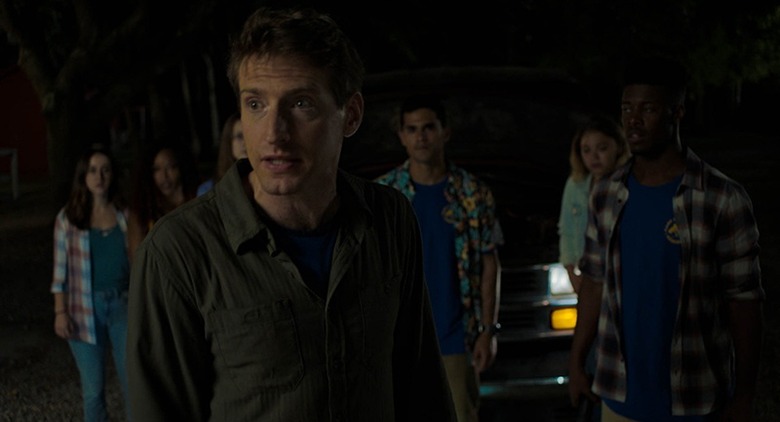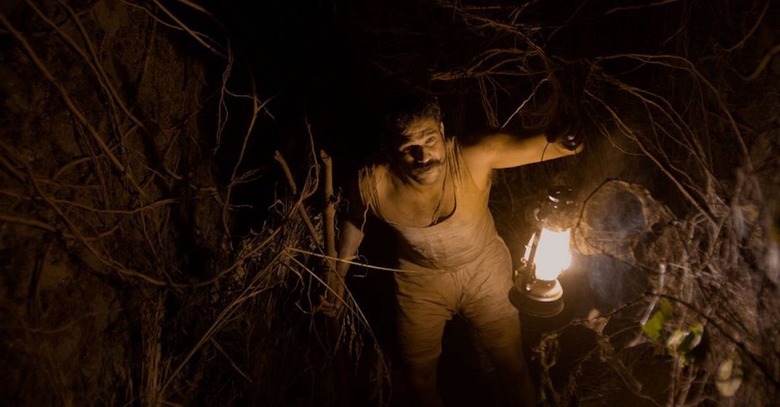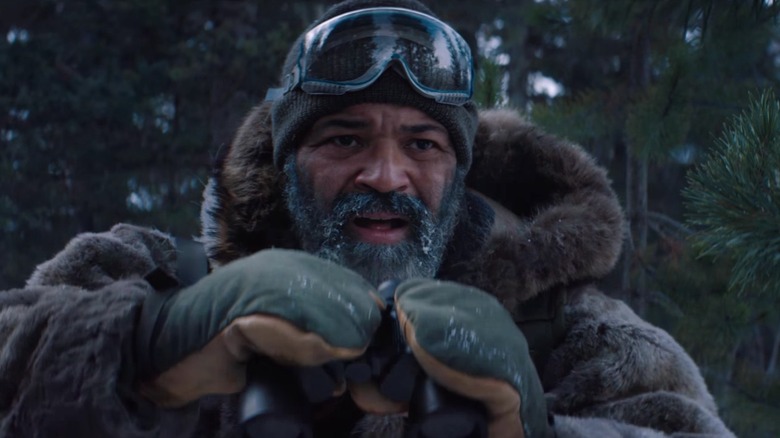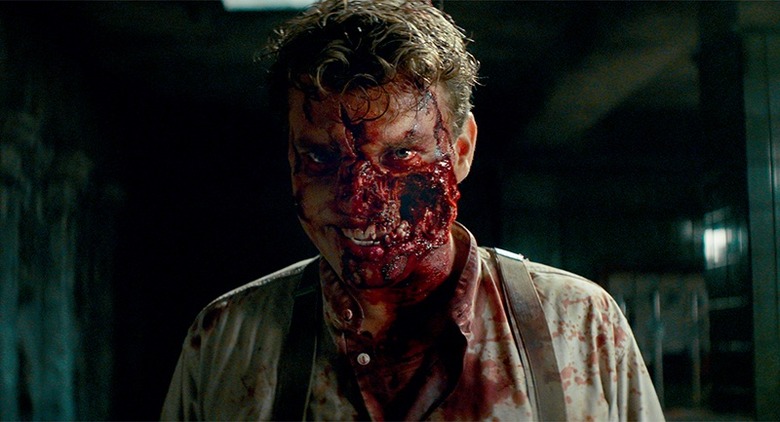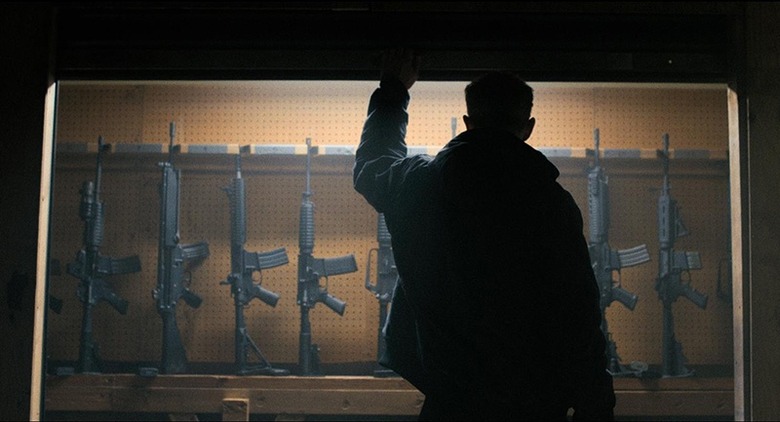Fantastic Fest Day 3: 'Overlord' Brings The Gory Goods, 'Hold The Dark' Punishes (In A Good Way), And 'The Standoff At Sparrow Creek' Announces The Arrival Of An Exciting New Filmmaker
(Welcome to The Fantastic Fest Diaries, where we will be chronicling every single movie we see at the United States' largest genre film festival.)
Welcome to Fantastic Fest, day three. In this diary entry: a well-intentioned horror comedy, a thrilling Indian tale of terror, the latest from Green Room director Jeremy Saulnier, Bad Robot's Nazi zombie adventure, and a one hell of a promising debut.
You Might Be the Killer is a Fantastic Joke That Goes On a Bit Too Long
It's an indelible premise. An employee of a comics and gaming store (Alyson Hannigan) receives a desperate phone call from a friend (Fran Kranz) – he's a counselor at an isolated summer camp and he's being chased by a masked killer and she's the pop culture aficionado with a knowledge of all-things-horror. So, what should he do if he wants to survive the night?
What a set-up! And the casting of Buffy the Vampire Slayer vet Hannigan and The Cabin in the Woods star Kranz acts as immediate shorthand for what to expect from the experience: a winking, knowing, and loving takedown of the horror genre and its laundry list of familiar tropes. And for its first half, You Might Be the Killer is a blast, a playful deconstruction of the kind of movie we've seen a hundred times before, all of it anchored by the delightful banter between Hannigan (deadpan, hilarious) and Kranz (frenzied, also hilarious). The film leaps through time, revealing its narrative out of order and keeping tack of the timeline via onscreen text tracking the body count. It's so clever that it hurts.
But the problem here is that You Might Be the Killer builds such a strange and singular internal mythology that it starts to trip over itself. Not satisfied to riff on the slasher movies we already know, co-writer/director Brett Simmons eventually gets caught up in the film's own finer details, creating so many rules and details that the film has to drop the pretense of comedy and satire altogether in its back half, where it devolves into a fairly boilerplate slasher flick punctuated by the occasional cute joke. It's painful to criticize a horror/comedy for having too many ambitions, but the film sings when its riffing on the familiar and lampooning the template. It's less effective when it tries to actually be what it's spent so much time twisting to shreds.
You Might Be the Killer is fun and funny, a film tailor-made for genre enthusiasts who will nod along with the references and grin when the characters on screen analyze their predicament like movie fans. But is also proves how hard it is to make a decent slasher movie in the first place.
Tumbbad is Classical Tale of Terror Punctuated by Cultural Specificity
Tell me if you've heard this one before. A selfish man comes into great power after discovering a cursed place that grants tremendous wealth. He builds a small empire. His reign spans generations as he loses his humanity. And then it all goes wrong.
The remarkable thing about Tumbbad is not that it's a beautifully made chiller in the Guillermo del Toro mold (although that is certainly true). What's especially striking is that director Rahi Anil Barve and his writers have crafted a movie that wouldn't feel out of place in a weird fiction anthology collecting tales of terror written between 1870 and 1920. This is classical horror in its purest form, the kind of horror fable that would have been cooked up by the likes of Rudyard Kipling, Robert E. Howard, and H.P. Lovecraft.
But unlike those admittedly brilliant but undeniably colonialist writers, Barve is from India, a nation with a long and painful history with western powers. So here is an Indian filmmaker taking the structure and tone of the most western of horror stories and infusing it with an energy that is unique to his nation, a story that bakes its colonialist setting into the very fabric of the narrative. Tumbbad's narrative spans 30 years, taking us from an India in the grip of Great Britain to a freed nation, a transformation that informs the journey of its lead character, a greedy, brutal man who inherits an old house with ancient, forgotten, wealth-granting god lurking under its grounds.
Smarter writers than me will analyze the cultural connotations of Tumbbad. All I can say is that this Indian film has beaten western filmmakers at their own game and made the best Kipling/Howard/Lovecraft-inspired movie in ages. Horror is universal. This kind of storytelling is universal. And Tumbbad, handsome and scary and captivating and moody and frightening enough to tighten your stomach into a knot, proves that white colonialism does not own weird fiction.
Hold the Dark is Powerful and Powerfully Bleak
One of these days, director Jeremy Saulnier will get around to making another comedy like his under-seen and underrated debut, Murder Party. But until then, he continues to join Joel and Ethan Coen in that line-up of the pre-eminent American filmmakers fascinated by human darkness and what makes the beast hidden within our "civilized" shells tick. Hold the Dark is Saulnier's bleakest film yet, surpassing the darkness of his mesmerizing revenge tale Blue Ruin and the punks-versus-neo-nazis bloodbath Green Room. Those films, for all of their intensity and carnage, were ultimately thrillers – there is excitement to be found within. Hold the Dark is as violent as those films, as merciless, as unforgiving, but it's never thrilling. This is a movie about violence, about humankind's innate need and ability to do harm to our fellows, where the bloodshed is never once amusing. It's exhausting. It's a traumatizing. It hurts.
Our window into this two-hour parade of existential despair and savagery is Russell Core (Jeffrey Wright), a wolf expert who journeys to small Alaskan village to assist a mother whose son was killed by the local wildlife. But this is not a "man versus killer wolf" movie, even though Russell's expertise in the realm of natural born killers and bloodthirsty instincts makes him the ideal witness to what transpires. It also makes him profoundly unlucky.
It's rare to see Wright, one of our finest character actors, get handed a leading role like this and he makes a case that filmmakers should work to make this happen far more often. Haunted and haunting, Core is a man wracked by ordinary human guilts, obsessed with the petty mistakes of his past. Or rather, Hold the Dark exposes them to be petty enough – Core's issues stem from the social constructs that keep us separate from the animals, but as he plunges deeper into a whirlwind of senseless bloodshed, it becomes apparent that those constructs are embers in a blizzard. A strong, cold wind will put them right out and we become the wolves we respect and fear from a distance. Our worst selves, the beasts we truly are, don't need much prodding to emerge. Especially in the isolation of Alaska. Especially once someone dangerous enough to decide the rules no longer matter topples the first domino.
Wright is surrounded by a strong cast: the always-welcome James Badge Dale (who is in three Fantastic Fest movies this year) plays the detective wrapped up in this mess and Alexander Skarsgård plays the dead boy's father, home from the war in Iraq and ready to take things too far to find personal satisfaction. Through these three men, Saulnier and screenwriter Macon Blair treat human nature like a science experiment, with the snowed-over forests and icy towns of Alaska as a sterile, unfeeling laboratory. They test each other. Hurt each other. Bring out the worst in each other. And the results are still inconclusive. Why do we do what we do? You might as well just ask the wolves, Hold the Dark says.
One sequence in particular stands out: an extended shootout so frightening and unpleasant that it avoids the common Hollywood trap of making violence exciting by default. There's no romance here. Just screams and whimpers and the suggested stench of blood.
Hold the Dark shares the aesthetics of past Saulnier films – the slow-burn escalation, the unblinking depiction of violence, the strange and horrible natural beauty of the land we coat with the blood of those who wrong us. If his previous work represents him working in Blood Simple territory, this finds him graduating to his own No Country For Old Men. Sometimes, all we can do is laugh in the face of darkness. Other times, though, all we can do is despair.
Overlord is a Wild B-movie Romp Polished With Bad Robot Shine
There was a window in the late '90s and early '00s when major studios were handing big budgets to genre filmmakers with bonkers B-movie premises and telling them to go nuts. This window got us creature features like The Relic and Deep Rising, and deranged science fiction like Event Horizon. These movies are unashamed of their intentions: take something silly, something ridiculous, something very much aware of its own potential camp factor, and give it a gleaming Hollywood polish typically found on movies that aspire to being more than sweet, delicious junkfood.
If you miss that window, if you miss glossy B-movies prepared by filmmakers who know exactly what they're making and the backing of a major studio, director Julius Avery's Overlord is what you've been waiting for. Here is a film that feels like it could've emerged from a 42nd street theater in 1971, but it features the producing power of J.J. Abrams and the technical polish you'd expect from any film bearing the Bad Robot logo. It's exploitation hiding in the skin of a "real" movie and that's part of its giddy, gory charm. It's a hoot.
Perhaps the film's greatest strength is that it takes itself completely seriously, never once winking at the camera. A handful of American soldiers sneak into a French village on the eve of the D-Day landings on a mission vital to the invasion's success. But they encounter more than they bargained for: Nazi experiments that feel like they shambled out of a Stuart Gordon or John Carpenter production. Throughout this all, the cast treats this movie like they're in Saving Private Ryan – this is no joke, damn it! That self-seriousness pays off as the film escalates and the goofy premise starts to feel like it actually matters rather than act as a platform for yet another splatter comedy in the Evil Dead mold.
Wyatt Russell, looking and sounding more like his father with each passing role, chomps the scenery as a grizzled veteran soldier who takes the insanity in stride. However, the heart of the film belongs to Jovan Adepo in a star-making turn as a green soldier who must harden quickly or risk Hitler's plan for a thousand year reich becoming all-too-literal. There's a stoic righteousness to Adepo that plays especially well when he's facing down gooey monsters. He takes it seriously, so we take it seriously. We care about what goes on beyond how these American soldiers will make these Nazi mutants splatter real good.
But make no mistake: this movie still finds plenty of time to make Nazi mutants splatter real good. This is an unapologetically gory film, one that relishes in grinding its villains (both undead and living) into a red goop. While some genre fans will take issue with the occasional reliance on CGI over wholly practical imagery, there's no denying that Avery's heart is the right, filthy place. This may be a B-movie, a live-action EC Comic Book, an update on the nazi-sploitation films of yesteryear, but 2018 is also a year that demands unapologetic Nazi villains and a bunch of two-fisted heroes willing to blow them to smithereens.
The Standoff at Sparrow Creek is the Best Reservoir Dogs Riff Since...Reservoir Dogs
There's an entire category of first feature films that fit the "It's like Reservoir Dogs with a twist!" mold, but few of them are as intense and clever as The Standoff at Sparrow Creek. Henry Dunham's feature debut really does start off as Reservoir Dogs with right-wing militia members instead of jewel thieves, but it launches beyond the familiar even as it wears its influences on its sleeve. This is disconcerting, dizzying filmmaking that challenges even as it thrills.
Taking place almost entirely in a gloomy warehouse that doubles as militia group's secret armory, The Standoff at Sparrow Creek wastes no time. An emergency meeting is called for the group's members: someone has opened fire on a police funeral. Lots of people are dead. The authorities are out for blood...and the shooter is among them. If they can ferret him out, maybe they can escape with their lives and freedom by offering him up. If not, they may not survive the night.
Dunham's tight, economical screenplay launches us into this clusterfuck with a desperate speed – these men need to solve this ASAP, and the movie never lets us forget it. The rat-a-tat dialogue is one part Mamet, one part Tarantino, stylized but to-the-point. All business. Leading the investigation is Gannon (James Badge Dale, popping up in this article for the second time), a former cop who must use his still-sharp interrogation skills to grill the other members of the group and figure out who pulled the trigger.
The Standoff at Sparrow Creek plays out as a series of lengthy conversations as Gannon tries to get to the bottom of things. Each interrogation acts as its own character study – who are these men and why are they here and why are each and every one of them capable of pulling of such a heinous act? The film is cloaked in shadows, with Gannon and his compatriots existing as silhouettes in a dark maze where trust is a rare commodity. The attempt to shed light of any kind becomes a dizzying, difficult task.
As a thriller, the film is the kind of edge-of-your-seat, nail-biting, stomach-churning experience you hope to find when you sit down to watch the latest "Reservoir Dogs in a _____." Dunham has the goods and his cast speak fast and furiously enough to ensure that his panicked dialogue sells every hard choice. However, the film is also troubling in ways that its peers so often avoid. The screenplay never pauses to inform you that these men are right wing terrorists. It expects you to recognize this, take note of it, and internalize it in the way you see fit.
The decision to portray these men as human rather than caricatures is downright stressful. Can you, The Standoff at Sparrow Creek asks, spend time with these people and recognize their humanity while also knowing that they wouldn't blink twice about planning and carrying out a massacre? It's enough to give you a stomach ache. Dunham places politics at the forefront by essentially refusing to linger on it. The film supplies a story and you supply the personal perspective and the final decision as to whether or this is irresponsible or not.
(The film's politics became the subject of a furious debate post-screening and I heard a half dozen different takes on why the film's perspective is brilliant, clever, wrongheaded, or just plain grotesque. For my money, that means the film did its job.)
The Standoff at Sparrow Creek is the kind of movie you attend festivals to find. I think we're going to be seeing more of Henry Dunham very soon and hopefully, his future movies are worth chewing on as much as this one.

